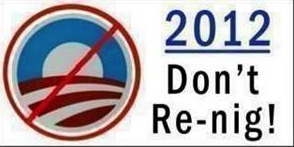Is "Don't Re-Nig in 2012" Rigged? Networks, AP cancel exit polls in 19 states
 When the UN monitors international elections, one way they determine if the election process is credible or fraudulent is to take exit polls and compare the actual results to those of the exit poll. Exit polls in America have always been accurate, confirming that our elections are allegedly fair and honest -- except in the two elections in which Bush was involved. Exit polling is the last semi-independent check of an election's accuracy and the only way to quickly determine if the votes cast for a candidate match those counted by electronic machines. E-voting is not publicly observable & is conducted privately [more] and [more] From [HERE] Breaking from two decades of tradition, this year’s election exit poll is set to include surveys of voters in 31 states, not all 50 as it has for the past five presidential elections, according to multiple people involved in the planning.
When the UN monitors international elections, one way they determine if the election process is credible or fraudulent is to take exit polls and compare the actual results to those of the exit poll. Exit polls in America have always been accurate, confirming that our elections are allegedly fair and honest -- except in the two elections in which Bush was involved. Exit polling is the last semi-independent check of an election's accuracy and the only way to quickly determine if the votes cast for a candidate match those counted by electronic machines. E-voting is not publicly observable & is conducted privately [more] and [more] From [HERE] Breaking from two decades of tradition, this year’s election exit poll is set to include surveys of voters in 31 states, not all 50 as it has for the past five presidential elections, according to multiple people involved in the planning.
Dan Merkle, director of elections for ABC News, and a member of the consortium that runs the exit poll, confirmed the shift Thursday. The aim, he said, “is to still deliver a quality product in the most important states,” in the face of mounting survey costs.
The decision by the National Election Pool — a joint venture of the major television networks and The Associated Press — is sure to cause some pain to election watchers across the country. (For a full list of the states that won’t have exit polls scroll to the bottom of this post.)
Voters in the excluded states will still be interviewed as part of a national exit poll, but state-level estimates of the partisan, age or racial makeups of electorates won’t be available as they have been since 1992. The lack of data may hamper election night analyses in some states, and it will almost certainly limit post-election research for years to come.
A growing number of voters casting early ballots has added to the complexity of carrying out surveys in 50 states, the District of Columbia and nationally. In more and more states it has become crucial to supplement in-person precinct polling with relatively costly telephone interviews in order to achieve representative samples.
In 2008, only 18 states included interviews with early voters, with notable absences in Indiana (24 percent of voters casting early ballots), Wisconsin (21 percent) and Virginia (14 percent), according to early voting estimates by United States Elections Project.
This year, exit pollsters are set to carry out phone polls in 15 states, about half of all states covered, and increase the sample sizes of those polls by 32 percent, according to Merkle. Moreover, the continued rise in the number of voters using cellphones also bumps up the price of phone surveys, another challenge motivating the changes for 2012.
(The Washington Post and other media organizations are subscribers to the exit poll, but not primary sponsors.)
With the inevitable, intense focus on sub-group analysis in the exit poll (e.g., percent of Hispanics voting Democratic and Republican), the consortium also made the decision to increase the number of interviews in the national poll by bumping up the number of randomly selected sampling precincts from 300 in 2008 to 350 this year.
Slicing the number of state surveys for more representative surveys may be a reasonable trade-off — but it will hit hard.
Here is a list of the states that will be excluded from coverage: Alaska, Arkansas, Delaware, District of Columbia, Georgia, Hawaii, Idaho, Kentucky, Louisiana, Nebraska, North Dakota, Oklahoma, Rhode Island, South Carolina, South Dakota, Tennessee, Texas, Utah, West Virginia and Wyoming.
Comparing this list with the election map, reveals how carefully the exit poll planners allocated resources. All 19 of the states with no exit polls are classified as either “solid Obama” or “solid Romney,” and there is only one “toss-up” gubernatorial or U.S. Senate race not on the list: the competitive North Dakota match-up of Heidi Heitkamp and Rick Berg.
Two other contests in the “leaning” Democratic category aren’t on the list: the U.S. Senate race in Hawaii and the governor’s race in West Virginia.